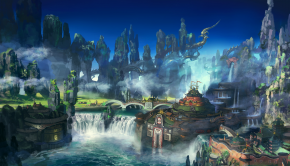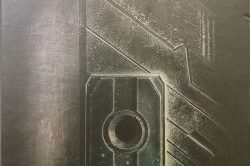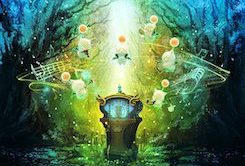Norihiko Hibino Interview: From Japan to Worldwide
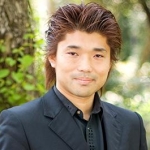 In September 2008, we got a chance to talk indepth with Norihiko Hibino. It comes at a time when his music production company GEM Impact is receiving widespread recognition for projects like Metal Gear Solid 4, Blassreiter, Commando 3, Yakuza 2, Elvandia Story, Ninja Blade, and the Etrian Odyssey arranged albums.
In September 2008, we got a chance to talk indepth with Norihiko Hibino. It comes at a time when his music production company GEM Impact is receiving widespread recognition for projects like Metal Gear Solid 4, Blassreiter, Commando 3, Yakuza 2, Elvandia Story, Ninja Blade, and the Etrian Odyssey arranged albums.
Hibino provides insights about all these works in this interview. He also discusses with us the artists and goals of GEM Impact, his history on the Metal Gear and Boktai series, some jazz and vocal projects, and even an album we hadn’t heard of until now…
Interview Credits
Interview Subject: Norihiko Hibino
Interviewer: Chris Greening
Editor: Chris Greening
Coordination: Jayson Napolitano
Interview Content
Chris: In just four years, GEM Impact has grown into one of the most reputable music production companies. What are the company’s principles?
Norihiko Hibino: This is our mission:
– To instill in the people we work with (clients, customers) a sense of passion and emotion, and bring happiness to as many people as possible.
– To allow as many people as possible (partners, performers and employees) to make their living through music.
What is unique with us is “we create music as a team”. As far as I know, this rarely happens in the United States. I share the skills I’ve learned as a composer, producer, engineer, and performer with the other composers on the team. With the management staff, I try to share my experience from when I was a business manager at a movie theater.
Rather than rely on one person to put everything together, everyone on the team provides a piece of the puzzle, so we can do things very fast. Of course each one of us has a different skill set and different life goals, but I try to encourage them through challenges and hope they benefit from working at GEM Impact so they can live on and try to make everyone happy!

Chris: There are three resident composers at GEM Impact, Takahiro Izutani, Yoshitaka Suzuki, and Takehide Ayuzawa. Could you tell us about their backgrounds, styles, and major works?
Norihiko Hibino: Takahiro Izutani used to work as a J-Pop arranger for well-recognized artists such as Ayumi Hamasaki, and he is really good at heavy beats and ambient music. Yoshitaka Suzuki is from the video game field with all the skills in video game sound production as well as a cinematic approach. These two have done Metal Gear Solid Portable Ops, Metal Gear Solid 4, Ninja Blade, and most of our works.
Takahide Ayuzawa has a classical background and is great at orchestration. An example is the 15-minute long Metal Gear medley for 20th anniversary CD, performed by a full orchestra in China.
Chris: Running such a large and multifaceted company must be very time-consuming. Do administrative duties sometimes make it difficult to compose as much music as you want to or do producers like DJ Uraken help to reduce your workload?
Norihiko Hibino: Well, yes, it is very time-consuming, not only as a CEO in the company and a composer, but also as a sax player as well. However, I have two really good assistants (Ayumi and Kaori), who help me a lot. DJ Uraken has handled the GEM Factory record label up until now, but he’s actually leaving GEM Impact to do his own thing, and my assistants will be operating the label. I also recently hired staff to handle our foreign business, so now I can concentrate more on business planning, new projects, and music creation.
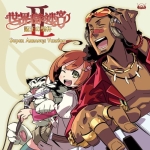 Chris: You are responsible for the sound direction for the Etrian Odyssey series’ Super Arrange Version albums. What were your main aims while producing these albums? What inspired your choice of guest artists?
Chris: You are responsible for the sound direction for the Etrian Odyssey series’ Super Arrange Version albums. What were your main aims while producing these albums? What inspired your choice of guest artists?
Norihiko Hibino: I targeted fans who would buy the CD as “Koshiro-san’s long time fans” and “my potential fans.” For Koshiro-san’s fans, the music has to stay true to the original as far as the arrangement is concerned, and they want arrangers who can handle the same style. For my fans, they want something “extreme,” whether it is an orchestral, rock, or ambient. I mean extreme in the sense that it holds the same kind of tension that players feel when playing key moments in the game, regardless of any genre.
Chris: Another of your recent album productions was the Metal Gear Music Collection. What were your considerations while compiling track listings for this release? Could you tell us more about how you approached creating the exuberant arrangements?
Norihiko Hibino: There was a talk with the head of Kojima Productions that they’d like an orchestral version of the Metal Gear music. I thought we should pick up music from the past 20 years rather than replay the recent hybrid music style so that the album would be something people hadn’t heard before.
I also thought there should be a mixture of “new and old”. I called up Izumi-san (he used to compose early Metal Gear music, and now composes for Guitar Freaks). I know he is an excellent guitar player and I wanted him to arrange his Metal Gear theme in a modern style.
Also, I had Shinya Kiyozuka, a very young classical piano player and a very enthusiastic Metal Gear fan (his generation is considered the 2nd generation of Metal Gear fans), and we played a Metal Gear Solid 2 ballad together. This album was number one on the sales charts on iTunes in the soundtrack category for a couple of weeks so I think all the hard work was worth it.
 Chris: You weren’t originally supposed to contribute to Metal Gear Solid 4: Guns of the Patriots, but GEM Impact were hired last minute to create 90 minutes of music. Could you tell us more about what the team offered? Was most of the music unreleased or were the album credits not complete? Is it normal for you to spend short intense periods on one project or was this an exception?
Chris: You weren’t originally supposed to contribute to Metal Gear Solid 4: Guns of the Patriots, but GEM Impact were hired last minute to create 90 minutes of music. Could you tell us more about what the team offered? Was most of the music unreleased or were the album credits not complete? Is it normal for you to spend short intense periods on one project or was this an exception?
Norihiko Hibino: Yes, because I left Konami right after MGS3, I became an “outsider” to most of the staff at Konami even though I quit on good terms. Mr. Kojima wanted to change the musical style for MGS4 and my junior, Toda-san, took all responsibility, so I stayed out of MGS4 for a while.
However, in January 2008 Mr. Kojima realized he still needed the iconic Metal Gear Solid sound that I’d done for the cutscenes. Harry’s music this time around wasn’t quite in this direction, and he wanted me to compose some of the major cutscenes, including in Harry’s song edits, changing them to fit the picture. As far as editing Harry’s music, I guess I’m the only one who can handle it of all Konami’s employees because I started collaborating with him on MGS2, and even did a lot of “secret” work under the name of Harry (the actual total length of Harry’s contributions were about 30 minutes or so, and I needed to compose the remaining several hours of music on my own for the previous MGS titles).
For MGS4 the time was so limited. We needed to finish it in three weeks including the final mix, so I decided to focus on Harry’s edits and directed GEM Impact and finished the project as a team. Thanks to all the teamwork it worked out so well, and we finished on time. That gave us great confidence and the following month we finished the music for Blassreiter, which involved 45 tracks in four weeks!
Chris: Talking of big projects, I was really shocked when I learnt that Suzuki also collaborated on the RPG Elvandia Story. Was it a real administrative feat to create such an elegant and coherent score or do your co-composers naturally complement your musicality?
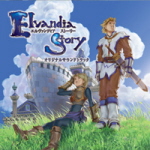 Norihiko Hibino: Truthfully, I directed Suzuki-san for Elvandia Story and he handled most of the composing work, regularly showing me his progress so I could check it. At the same time, Izutani-san was working on Yakuza 2.
Norihiko Hibino: Truthfully, I directed Suzuki-san for Elvandia Story and he handled most of the composing work, regularly showing me his progress so I could check it. At the same time, Izutani-san was working on Yakuza 2.
We spend a lot of time at work collaborating on projects, learning how to build tracks, and figuring out how to balance the music with dialog and sound effects. I deliver the final product to the client only when I’ve evaluated everything the team has done. I also spend a lot of time with clients to understand what they want, and learn about their cultural background (especially if the project is outside Japan). Because of this preparation I rarely fall short of my goals, and that enables us to build a relationship of trust between our composers and developers.
All of the composers at GEM Impact are well trained in my way of building tracks, which I in turn learned from collaborating with Harry and my own experience as a sound engineer. Because of this, any composer on the team sounds like “GEM Impact,” regardless of their difference in styles.
Chris: For Yakuza 2, you and Izutani crafted a unique blend of oriental, rock, and ambient music. How do you go about using oriental instruments and integrating them into such fusions?
Norihiko Hibino: Not only oriental instruments, but I like to use any acoustic instruments as a “sound tool” for sound design, not only for a melody. You can hear the noise the pick makes when it touches the guitar strings or the crazy flute in MGS3 and my freaky sax in MGS2 and MPO. It’s the same thing with Yakuza 2 with the shakuhachi. Some of them are totally unintentional and improvised, and I think this is possible because I have both experience as a professional sax player and have a wide network of players, as well as sound engineer that can imagine processed sound from an instrument. That includes a lot of “human” elements that catch a player’s heart in video games with non-real human characters.
Chris: I’ve never really seen you discuss your works on the Boktai, Hikaru no Go, or Yu-Gi-Oh! series at Konami so thought I’d give you a chance to talk about them too. To what extent did you participate in these projects? Do these works exhibit a lighter tone than your Metal Gear creations?
Norihiko Hibino: Well, actually, I spent quite a lot of time on Boktai and Yu-Gi-Oh while I was in Konami, but because they were on the GBA and DS, I couldn’t speak up about sound. Mr. Kojima wanted a “gothic” taste for Boktai, similar to what you would hear in early horror movies, and for Yu-Gi-Oh, the director wanted me to create a “Gladiator-like” track. So I started creating instrument samples that sounded rich and heavy, even from the tiny speakers of the consoles. Fortunately I had my junior, Kobori-san (one of MGS4’s composer) with me, and he did a great job adjusting all my MIDI data so that it sounded OK on the DS and GBA. I did almost everything on Boktai and Yu-Gi-Oh 7, but for Boktai 2 and Yu-Gi-Oh 8, I concentrated more on directing the in-house composers.
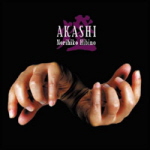 Chris: GEM Impact is also well-recognised for its vocal works. Could you tell us more about your personal vocal compositions and your collaboration with harario? Do you have a personal favourite? What about the team’s work with vocal artists like Ayumi Hamasaki?
Chris: GEM Impact is also well-recognised for its vocal works. Could you tell us more about your personal vocal compositions and your collaboration with harario? Do you have a personal favourite? What about the team’s work with vocal artists like Ayumi Hamasaki?
Norihiko Hibino: Thanks to harario, the head of my music school who’s now in the States, I learned so many things about vocals, such as range, tonality, what I can and can’t do with vocal lines. We’ve worked very closely since MGS3. She even sung the first samples of “Snake Eater” and most of my first samples for J-Pop artists like Yuki Koyanagi and others. She also sings in my own album, AKASHI, so she’s quite versatile.
Besides video game works, I write a lot of vocal pieces for small and big projects. I sometimes compose the music for them too. My least known work was creating a whole album with six singers from my music school. We developed a musical-style game with FromSoftware called Cuffy-Musical. The characters in the game are actually dogs that sing, and we tried to match each of the character’s personalities to our singers, which was quite interesting. It added a touch of reality when they were singing. You can get the album at CDBaby!
Chris: The motto of GEM Impact is ‘from Japan to worldwide’. Can you tell us some more about your international collaborations? What approach did GEM Impact take when creating the music forCommando 3 and 1942: Joint Strike?
Norihiko Hibino: The motto isn’t only about broadening our client base to a worldwide scale, but to also create something universal. My good friend David Chen from Foundation 9 helped me to hook up with Capcom USA for Commando and 1942. It is always great to have friends like him who can speak up about us.
I always say to my composers, “think globally,” and Japan is great place to find all the music and culture from East to West, Europe to the States. In Japan we like 2D textures such as in Ukiyo-e, but people in Europe love the more in-depth perspectives. The same thing is true in music and we need to have to add depth to the mix if we’re targeting fans in Europe.
Chris: GEM Impact has also worked extensively on anime projects like Blassreiter or ROBO ROCK and other cinematic projects like Bande Dessinee 2. Could you inform us about your accomplishments in this field? Does the team’s approach to these projects markedly differ to their approach to game projects?
Norihiko Hibino: What we do for anime is quite similar as we do for videogames, as long as the project is targeted worldwide. The difference between anime and games is that in anime we never know where our music will be placed, so we don’t have many retakes. We like doing both kinds of projects.
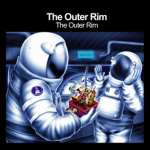 Chris: Your jazz band The Outer Rim recently released their debut album to great reception. What influenced the No More Heroes tie-in? Are you continuing to perform regular live gigs? I have no idea how you fit everything in!
Chris: Your jazz band The Outer Rim recently released their debut album to great reception. What influenced the No More Heroes tie-in? Are you continuing to perform regular live gigs? I have no idea how you fit everything in!
Norihiko Hibino: The Outer Rim was formed by top-notch experienced jazz musicians led by bassist Jeff Curry. Because our music is so cutting edge, I felt there had to be some kind of attachment to an existing franchise, otherwise it’d be difficult for people to appreciate our music. I felt the “craziness” of No More Heroes and The Outer Rim were somewhat close, and I decided to let the band cover the main theme. We play once every month or two, and have fun!
Chris: Another of your revered non-game projects was the original album Akashi. While working as a jazz musician in Kansas, you also produced quite a few lesser-known solo albums. Could you tell us more about these works? Can we expect another solo album from you in the future?
Norihiko Hibino: After I came back to Japan I made my private album, Now I Here to Hear…, from my own label. It’s a jazz quartet with all my originals, focusing on beautiful melodies and sophisticated changes. This band was strong and the recording was done at the best time.
My own solo album, Akashi, was made right after I started GEM Impact. This was more like a showcase of what I had done in the past and I wanted to do for the future at that time.
Now I feel like I want to produce another album featuring singers of Asian descent (second generation living outside Asia). I want to create smooth, spiritual tracks, and they can each sing both in their native languages and in English. I want to do this because there’re so many talented people in Asia but many of them get educated in the US or the UK and leave their own country (especially Southeast Asia) and never go back! But they feel their country is their home. Nowadays Asia has got so much power in both culture and economics and it’s time for Asian countries to start up their own entertainment culture. I have a plan to build a top-class recording studio in Malaysia for their production, and it will be a fantastic place for Asian artists!
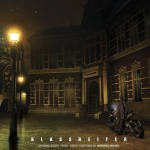 Chris: All of GEM Impact’s projects I’ve heard are especially technologically accomplished. What equipment do you use? Is it common to integrate some instrumental performances into your productions as well?
Chris: All of GEM Impact’s projects I’ve heard are especially technologically accomplished. What equipment do you use? Is it common to integrate some instrumental performances into your productions as well?
Norihiko Hibino: Our composers work with their PCs and we have a production studio that enables us to record acoustic instruments. It is very common for us to integrate instrumental performances into our music. Sometimes I record some instrument samples before a project starts and share the samples with the composers as material. They are mostly required to prepare all the audio tracks (instruments) in separate files for external mixing. I handle talking to clients and the composers focus on creating music under my direction.
Chris: GEM Impact also has a music production division for Pachinko and Mobile projects. Do these projects also offer unique technological challenges?
Norihiko Hibino: What is unique with production for Pachinko and Mobile is that we customize the audio mix on the platform. We even decide which instruments to use so that we can get the best results in certain output environment. For example, we never use rich and soft strings for a Pachinko project. It would never be heard in a noisy Pachinko hall.
Chris: Moving on to your upcoming projects, what can we expect from Live Music for Piano and Strings: Sekaiju no MeiQ I & II Super Arrange Version? Can you give any hints on the type of music that will feature in the big Microsoft project your team is working on?
Norihiko Hibino: Well, as you know now, the Microsoft project is Ninja Blade, which has just been announced. This will be a landmark for GEM Impact alongside Blassreiter in terms of our composers’ complete accomplishments.
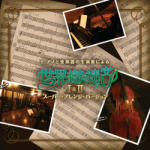 As for Sekaiju, I really did everything from choosing the pieces, writing the arrangement, prepare the parts, calling the musicians, conducting in the studio, and the final mix.
As for Sekaiju, I really did everything from choosing the pieces, writing the arrangement, prepare the parts, calling the musicians, conducting in the studio, and the final mix.
The budget for the whole production was so limited (equal to only one song’s budget for a major record), and I really needed to think to make it work. Thanks to great musicians (they are really good friends of mine), it came out great! It has a soft bossa-nova feel, which is better to calm you down at home or at a vacation home. I won’t get any money from this project but it was so fun, and this will expand game’s cultural standards for sure.
Chris: Thanks so much for taking the time to talk to us today. As you can probably tell, I’m a really big fan of your work so it is a massive honour for me to conduct this interview. Is there anything else you’d like to say to those reading this?
Norihiko Hibino: Thanks so much! I always felt that there were only a few people who even noticed what I was doing, but now I’m so lucky to get chance to talk about my work, and to know that there’re fans who like it. That really gives me energy for the next project! Thanks everyone!
Posted on August 30, 2008 by Chris Greening. Last modified on April 23, 2014.

